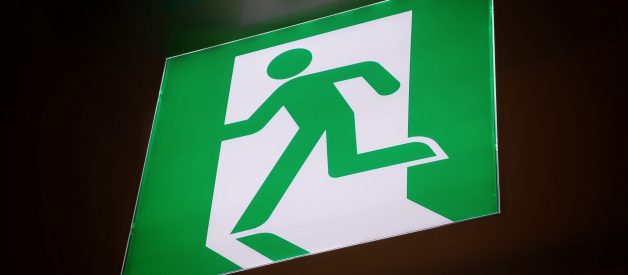 Photo by Franck V.
Photo by Franck V.
It is a generally accepted fact that quitting a job before you have another one is an incredibly foolish thing to do.
There are all kinds of supposed reasons for this:
Employers always prefer to hire people who have a job. Quitting without a plan is impulsive and irresponsible. You will probably go broke. Winners never quit (and quitters never win).
As with most of the ?common knowledge? out there, it?s not that simple.
What if your workplace is toxic? What if your job is so stressful it?s making you sick? What if your work is slowly crushing your soul and making you question your very existence? What if the guy in the cubicle next to you ?doesn?t believe in deodorant??
I am a pretty risk-averse person. If I am going to quit a job, I would prefer to have a plan in place, but this isn?t always possible. It would seem a lot of people can relate.
I talk to people everyday about their work and very often they mention that they?d love to quit their current job. Sometimes they want to find a better job. Some want to do their own thing. Others want to travel the world or take a sabbatical. When I ask them if they think they will in fact, quit, they almost alway say no.
These disengaged employees usually cite one of a number of ?facts? about why they can?t quit. Unfortunately, these facts are really myths.
Let?s unpack some of them.
Myth 1: It?s harder to get a job when unemployed
I once interviewed a consultant that had a year-long employment gap on his resume. He had valiantly tried to fill this gap with things like volunteer work and travel, but it was what it was: an employment gap.
When I asked him about it, he was transparent. He had felt burnt out. The hours and the travel had worn on him. The culture was competitive to the point of being unhealthy. Backstabbing and double-crossing were the norm. He walked away without a plan because he knew he needed to get healthy, see the world, and gain some perspective.
He wasn?t afraid of hard work he told me, he just needed his hard work to serve a meaningful purpose. He understood that now and was ready to get back to work, hopefully with our company.
I eventually hired him and I hear he?s still doing a great job.
I have reviewed countless resumes and made hundreds of hires in my career. I have found absolutely no correlation between being employed at the time of hire and success in the new role.
Have I hired people that were unemployed at the time that didn?t work out? Of course. Have I hired people straight from shiny companies with fancy job titles that oversold what they actually accomplished in their previous role? Yes. Did they work out? No, no they did not.
In truth I am still searching for the perfect correlation between candidate background and hiring home run (if you?ve cracked that code, let me know so we can write that book together). The one thing that has come the closest though, is honesty.
I don?t just mean telling the truth, I mean being totally forthcoming. It is the unexplained employment gap that raises red flags with employers. If you got fired, say you got fired and what you learned from it. If you quit without a plan, explain why. A skilled interviewer is going to see through your bull anyway, so you might as well be truthful.
And if they can?t handle your honesty, you don?t want to work there in the first place. Remember, a job interview isn?t some contest you are trying to win.
After you get the job, you have to show up and actually do it.
Myth 2: You will go broke
I should be super clear here-I am not a financial advisor and the truth is . . . you might actually go broke!
Point of fact, I?ve done just that.
After getting burnt out writing for a newspaper, I quit my job, packed up the few belongings I had into my pickup truck, and moved to Nashville.
Did I have a job lined up there? No. Some solid leads at least? Nada. Was I going to change my name to Dusty Walker and try to make it as a singer-songwriter? Maybe.
No, the truth of my ?plan? is actually rather embarrassing.
One weekend while working for the newspaper, my best friend (who lived in Nashville) came to visit me and we ended up going to see the movie Old School. In the movie (a sophomoric comedy which was not really intended to be a film to base major life decisions on), a group of friends struggling to adjust to adulthood end up getting a house near a college campus where they throw parties and escape from the Real World for awhile. Of course everyone in the end realizes this is a horrible idea and they all get their act together and grow up.
But we really loved this movie.
So my friend called me up when he got back to Nashville and said, ?You know, I have a house near a college campus. Why don?t you quit your job and move in with me??
Aaaaand that?s what I did.
I tried to get by working as a waiter and substitute teacher but after about a year, I pretty much went broke.
Do I regret it? No, it was one of the best years of my life and I think I needed that time to learn that financial stability and a routine were things I very much needed and valued in my life, I just didn?t know it. I also didn?t have a family to support or anyone at all depending on me. (Other than my best friend who graciously let me pay rent late almost every month.)
While I did go broke, not having a real job allowed me the time and space to find a real job. Who knows how long that would have taken me to do while working at the newspaper. I was working on deadline, turning in articles at 10pm each night and going home exhausted. It didn?t leave a lot of time to find a new job.
Not having a job was the kick in the pants I needed to find a job.
Of course, if you do have people that depend on you, don?t do anything stupid. Take stock of your savings and determine how long you can afford to be without work. And always, always talk it over your partner (if you have one) as they need to be all-in with you on the decision.
Myth 3: Winners never quit
Technically, this one is true. You cannot win a thing if you quit trying to win that thing. But, this advice applies more directly to board games than your career.
Once, at the tender age of six, after losing a game (of chance!) to my younger sister, I threw down my handful of plastic cherries in a fit of rage and vowed to never, ever again play the stupid, horrible game that is Hi Ho Cherry-O. I am sure my mother admonished me that day with the age-old nugget that ?winners never quit?.
And she was sort of right!
I have never won that godforsaken game because I never played it again.
Quitting gets a bad rap. For many, the word connotes weakness, laziness, or dishonor.
But stubbornly plodding along in a role or at a company that makes you miserable isn?t honorable, it?s foolish. It isn?t winning, it?s settling. When you quit a job, you aren?t declaring that you are quitting work forever (if you are doing that, then yes, that?s pretty lazy).
Finding a job is a full-time job. It?s incredibly hard work to do it right and it can be very stressful, especially if you are employed and conducting your search in secret. If you know for a fact that the job you have is not the job you want, you might need to quit so that you can fully commit yourself to your search for a better job.
The difference between being a winner and loser when quitting comes down to whether or not you are being intentional when you quit.
If you quit your job in a fit of rage and walk out without giving a proper notice, that?s not intentional. That?s being a loser (and napalming the bridge as you go). If you strategically survey your career prospects at your current company and decide that you need to devote time and energy to learning new skills or to finding a new job, give proper notice, and leave your job on good terms, that?s quitting intentionally.
Quitting your job without a safety net might be terrifying, but it might also be exactly what you need to do.
Your current boss probably won?t understand. That friend of yours that loves to give career advice (even though he hates his job) is going to think you?re crazy. Your parents will definitely think you?re crazy.
But it?s your career and no one else?s.
And sometimes the only thing between you and the first day in a job you love is the last day at a job you hate.
Are you looking for meaningful work? Get my Monday Morning Memo and never miss an article. Sign up here.


